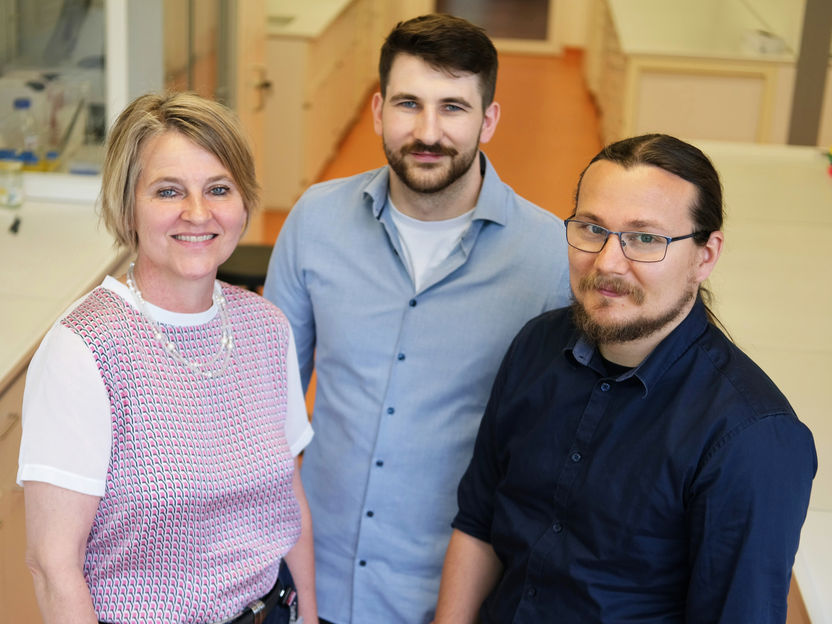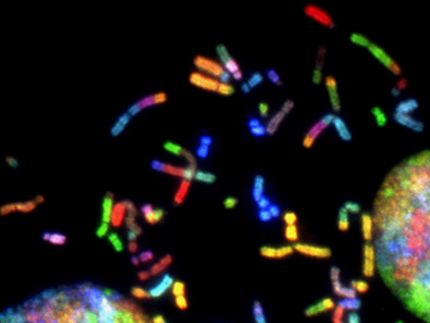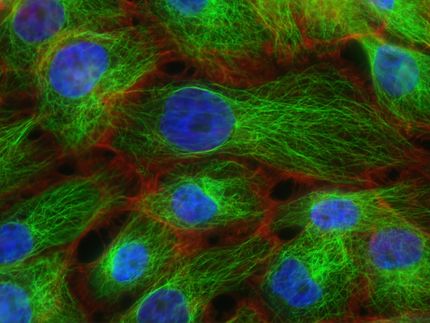Cancer cells have an Achilles heel
"This basic research can form the basis for new therapeutic strategies against cancer"
Advertisement
A hidden weak point in tumor cells opens up a new starting point for cancer drugs: a research team from Saarland University and the Helmholtz Institute for Pharmaceutical Research Saarland (HIPS) targeted a key protein as part of an international project: it offers a target for sensitively disrupting the energy metabolism of cancer cells and, to put it bluntly, turning off their juice.

Alexandra K. Kiemer, Simon Both (center) and Martin Empting (right) discovered a weak point in tumors: a protein that can be used to attack the energy supply of cancer cells.
© UdS/Ehrlich
Together with research groups from Canada, the USA and Korea, they tracked down proteins that help tumors grow and spread. The researchers have published their findings in the journal Cell Genomics.
The protein with the sober-sounding name PLK1 is actually involved in the division of cells in our body. However, PLK1 also plays a serious role: it contributes to tumor cells mutating, growing rapidly and giving cancer patients a poor prognosis. As a result, the protein makes therapy more difficult because it encourages tumors to consist not just of similar cells, but of many different cells with different characteristics. An international research consortium is therefore on the trail of the PLK1 protein with good reason: the aim is to find new approaches for cancer therapies against malignant tumors that tend to grow and spread aggressively.
However, "Polo-like kinase 1", as PLK1 is fully known, is not making things easy for the researchers from Canada, the USA, Korea and Germany. This is because attacking the protein directly to prevent mutations did not lead to the desired success. Various pharmaceutical companies have already developed inhibitors. "However, directly inhibiting the activity of PLK1, i.e. stopping, slowing down or otherwise disrupting the processes, has only shown limited clinical benefits. Patients did not benefit from this," explains Alexandra K. Kiemer, Professor of Pharmaceutical Biology at Saarland University.
The researchers therefore tried to tackle the protein in a roundabout way, through the back door, so to speak. In doing so, they came across IGF2BP2, another protein that interacts with PLK1: Both proteins have an effect on each other and are closely related and interact. "We were able to show that IGF2BP2 is a worthwhile alternative target for targeting PLK1 in tumors," explains Alexandra K. Kiemer. Together with Professor Martin Empting and doctoral student Simon Both, she has succeeded in proving this: IGF2BP2 is used to access PLK1 and its harmful actions.
When tumors grow and spread in the body, it is an extremely complex interplay between a wide variety of players. Countless mechanisms take place at the molecular level. Many protagonists are involved like tiny cogs in a big machine. For example, some of them contribute via intermediate steps to cell signaling pathways running incorrectly and processes that regulate how cells grow and divide being disrupted by mutations. The IGF2BP2 protein is just such a small cog in the wheel that sets processes in motion that also influence PLK1.
"The IGF2BP2 protein is a tumor supporter; it encourages the cancer to grow and spread. If we inhibit this protein, the tumor grows more slowly and stops mutating," Martin Empting sums up. "In our series of experiments, we inhibited the activity of IGF2BP2. We were able to show that this inhibits the growth of tumors in which PLK1 is involved. IGF2BP2 and PLK1 are genetically interdependent. Without IGF2BP2, PLK1 is also downregulated and tumor growth is significantly restricted," says Martin Empting, explaining the Saarbrücken research team's findings. Empting is Professor of Medicinal Chemistry of Anti-Infectives at Saarland University and conducts research at the Helmholtz Institute for Pharmaceutical Research Saarland (HIPS).
Without the IGF2BP2 protein, genetic information is not passed on, the metabolism in the cancer cells is disrupted and this at a sensitive point: the cell's power plants. "The mitochondria produce the energy that cells need for their processes. They are dependent on certain proteins to do this. Without IGF2BP2, the energy metabolism of the cancer cell is severely impaired," explains doctoral student Simon Both, who conducted the series of experiments. The fuel tap is therefore turned off for the energy-hungry cancer cells.
"With the IGF2BP2 protein, we have found an Achilles heel of cancer cells that can now be exploited in the fight against the tumor-promoting properties of PLK1. This basic research can form the basis for new therapeutic strategies against cancer," says Alexandra K. Kiemer.
Note: This article has been translated using a computer system without human intervention. LUMITOS offers these automatic translations to present a wider range of current news. Since this article has been translated with automatic translation, it is possible that it contains errors in vocabulary, syntax or grammar. The original article in German can be found here.
Original publication
Chelsea E. Cunningham, Frederick S. Vizeacoumar, Yue Zhang, Liliia Kyrylenko, Simon Both, Vincent Maranda, He Dong, Jared D.W. Price, Peng Gao, Konrad Wagner, Yingwen Wu, Mary Lazell-Wright, Ashtalakshmi Ganapathysamy, Rithik Hari, Kalpana K. Bhanumathy, ... Andrew Freywald, Franco J. Vizeacoumar; "Identification of targetable vulnerabilities of PLK1-overexpressing cancers by synthetic dosage lethality"; Cell Genomics
























































